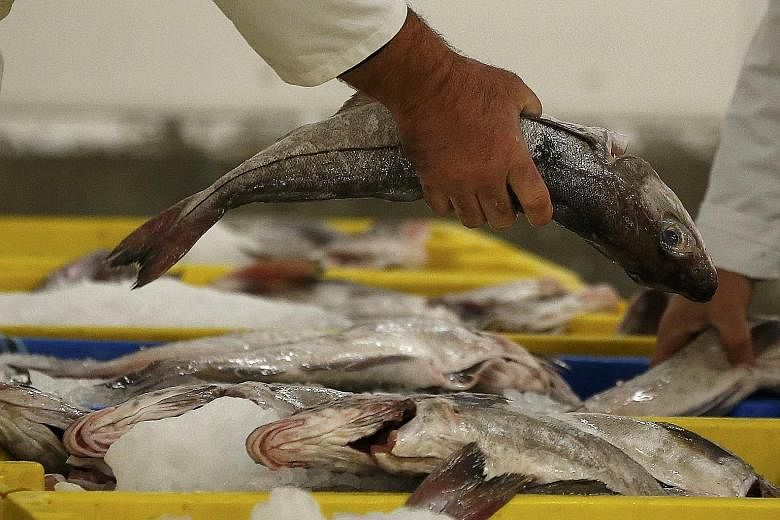PARIS • The global fisheries catch has been underestimated by more than half since 1950, with tens of millions of tonnes unreported every year, said a study, warning that stocks may be running low.
About 109 million tonnes of fish were caught in 2010 - 30 per cent higher than the 77 million tonnes reported to the United Nations' Food and Agriculture Organisation (FAO), according to the study on Tuesday.
This meant that about 32 million tonnes of catch went unreported that year, "more than the weight of the entire population of the United States", said a research duo from the University of British Columbia, Canada.
In the peak fishing year of 1996, the FAO had documented a global catch of 86 million tonnes. In fact, it was closer to 130 million tonnes, according to the research published in Nature Communications.
"The world is withdrawing from a joint bank account of fish without knowing what has been withdrawn, or the remaining balance," said the study's lead author Daniel Pauly.
For the study, Dr Pauly and his colleague, Dr Dirk Zeller, compiled a "catch reconstruction", combining FAO data with estimates of figures countries generally excluded from their official reports. These included small-scale commercial or subsistence fishing, recreational or illegal fishing, and discarded bycatch.
The pair of researchers, backed by a team of 100 collaborators from more than 50 institutions, relied on academic literature, industrial fishing statistics, local fisheries experts, law enforcers, coastal communities and tourist catch data.
"We find that reconstructed global catches between 1950 and 2010 were 50 per cent higher than data reported to FAO suggests," the authors wrote.
They called for more robust reporting and monitoring of catches.
"This groundbreaking study confirms that we are taking far more fish from our oceans than the official data suggests," commented Mr Joshua Reichert, vice-president of the Pew Charitable Trusts, which supported the work.
"It's no longer acceptable to mark down artisanal, subsistence or bycatch catch data as zero in the official record books."
The team also found that the annual catch has been declining since 1996 at a much faster rate than suggested by FAO data. And rather than the result of catch quotas, the trend may point to stocks running low, Dr Pauly said.
The FAO had reported the catch shrinking by about 380,000 tonnes per year from 1996 to 2010, but the reconstructed data pointed to a decline of 1.2 million tonnes per year.
The drop was mainly in large, commercial fishing - which accounted for 73 million tonnes in 2010, combined with "gradually reduced" levels of discarded bycatch - to about 10.3 million tonnes per year on average.
But small-scale artisanal catches are on the rise - from about 8 million tonnes in the early 1950s to 22 million tonnes in 2010.
Subsistence fisheries caught about 3.8 million tonnes per year between 2000 and 2010, and the global estimate for recreational catches is a million tonnes per year.
The team conceded that, as with data submitted to the FAO, their reconstruction "implies a certain degree of uncertainty".
Nevertheless, "these new estimates provide countries with more accurate assessments of catch levels than we have ever had", said Mr Reichert.
The FAO said there were concerns about a few "technical elements" of the study, but it agreed with the basic conclusions.
AGENCE FRANCE-PRESSE

